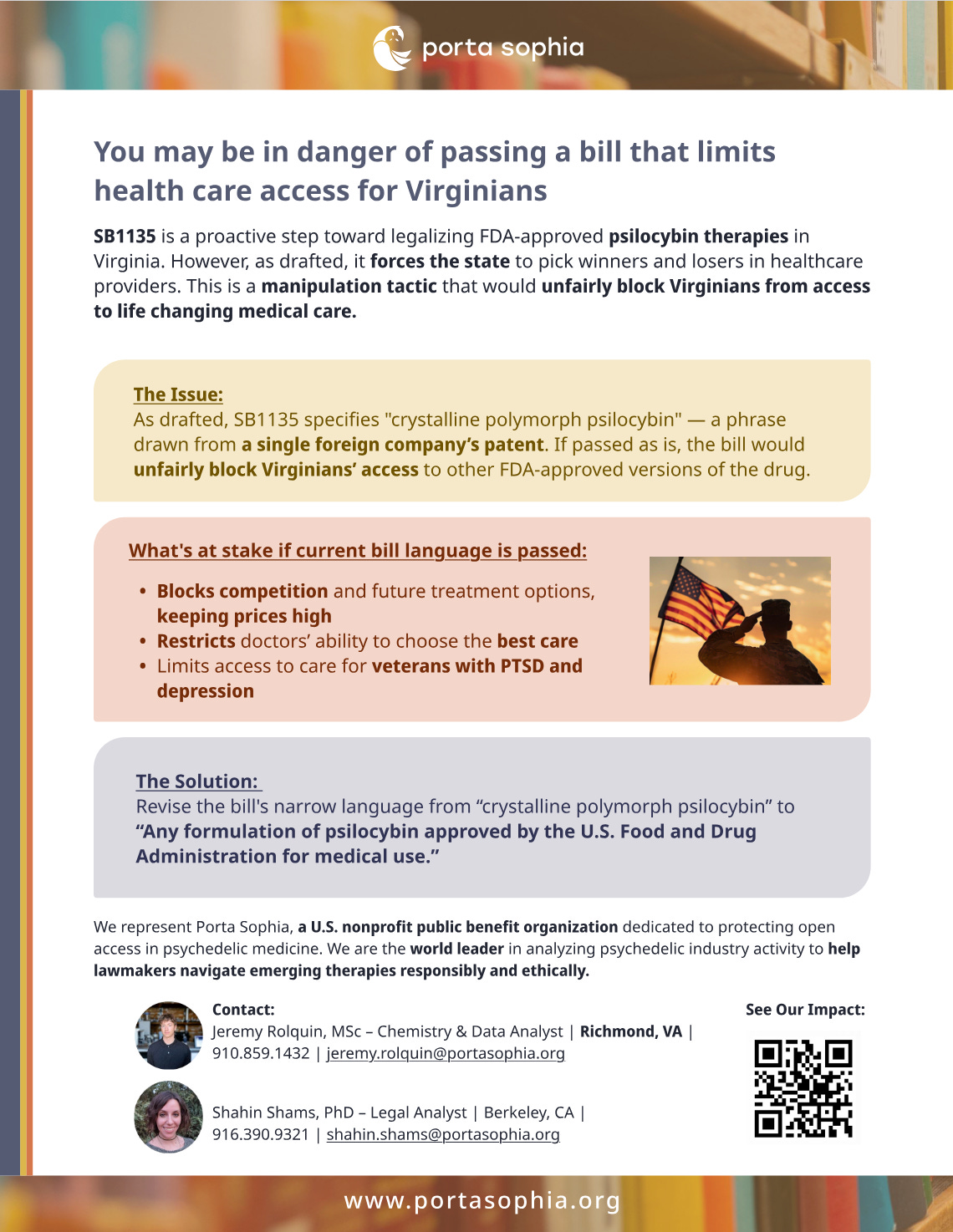Compass’s patented-psilocybin trigger laws: 5 Questions for Porta Sophia’s Jeremy Rolquin and Shahin Shams
Shams and Rolquin discuss the potential implications of passing Compass-specific trigger laws and what Porta Sophia is doing to address them.
The 2025 legislative session saw dozens of psychedelics-related bills across the U.S., with nearly half of U.S. states introducing dozens of laws proposing to study, decriminalize, or even state-legalize psychedelic substances. In January of this year, we reported on Colorado’s House Bill 1063, which proposed making COMP360, the psychedelic company Compass Pathways’ proprietary formulation of psilocybin, legal at the state level should the U.S. Food and Drug Administration approve it as a drug. The bill eventually passed, and over the next few months, several similar bills popped up in Virginia, Kansas, Pennsylvania, Arizona, Iowa, and Georgia as well.
Some of those bills also specify COMP360, while others use the term “crystalline polymorph psilocybin,” which also refers specifically to Compass’s formulation. (The Microdose has reached out to Compass several times in the last few months about their legislative efforts, but we have not received a response.) In June, the British company announced preliminary results for their Phase 3 clinical trials using COMP360 to remedy treatment-resistant depression; in 2021, the company came under fire for its patent claims to protect COMP360. Groups like Porta Sophia, a non-profit known for their work challenging patents, called the patent overly broad. (For more about Porta Sophia, read our interviews with founder David Casimir and our earlier interview with Shahin Shams.)
Jeremy Rolquin and Shahin Shams, analysts at Porta Sophia, noticed these recent trigger laws as well, and The Microdose spoke with them about the potential implications of passing these Compass-specific trigger laws and what the organization is doing to address them.
How did this issue get onto your radar?
Jeremy Rolquin: I used to work at the Virginia Commonwealth University School of Medicine in a lab that studied psychedelics — that’s where I got my master’s in medicinal chemistry studying psychedelics. One of my co-workers there reached out to me in May, and she said she’d been invited to a meeting about psychedelics in Chesterfield County, the county directly south of Richmond, Virginia’s capital. And I was like, “Oh, that’s interesting. What about?” And she said that it was in relation to this bill, SB-1135, which was put up for a vote in the last legislative session, and had to do with polymorphs of psilocybin.
That term is something that I see a lot in the patents that we examine here at Porta Sophia. It’s becoming increasingly prominent, so we as a team have been quite familiar with it. When I heard that, I was, first of all, shocked that I hadn’t heard about it, but then I became super curious as to why this was coming up now.
That co-worker invited me to the hearing, so I immediately said yes and asked if I could bring Shahin. Since then, we’ve found bills in 10 other states that all describe the same thing as SB 1135: a “crystalline polymorph” of psilocybin. Three have passed; others have been put up for vote, or are in a pre-draft period.
You mentioned that this term “crystalline polymorph psilocybin” is familiar to you. Can you say a bit more about why it’s important?
Shahin Shams: Crystalline polymorph psilocybin isn’t scientific language — it’s a patent portfolio or marketing term for COMP360.It is still very restrictive and would likely lead to court challenges to see if any other providers would be able to enter that state.
There are about a dozen Phase 3 clinical trials for psilocybin in motion from a variety of sources: for-profit companies like Compass and Cybin, and the non-profit Usona. [Reporter’s note: Porta Sophia was co-founded by Usona’s founder, and has received funding from the organization.] And then you have a lot of different universities that are using other versions or just public domain versions of psilocybin as well. If approved by the FDA, those wouldn’t have the proprietary upcharge that you usually see in the pharmaceutical world.
According to the executive director of Virginia’s Board of Pharmacy, who we’ve met with, this is the first time a company seeking to legalize just its product has put forth a bill in the state legislature. This has not happened before for them. Their role is to be a regulatory body that aligns the state of Virginia with federal guidelines; they generally meet once a quarter. The fact that they’ve never seen something like this before suggests this could be a new tactic, and because this is such a unique field of medicine, it could be ripe for exploitation. We want to make sure that this doesn’t become a trend.
Subscribe for more interviews and our weekly news roundup. (P.S. It’s free!)
You spoke with legislators while you were in Virginia for that bill hearing. What were their thoughts on this issue?
Jeremy Rolquin: Dealing with lawmakers is very interesting; they’re often very to-the-point. I had one lawmaker call me personally from his cell phone after I called his number; I’d left him a voicemail that laid out the issues that we had with this bill. When he called me back, he said, “I’ll never legalize an addictive drug like psilocybin.” Talking to someone like that brought me back to earth; it made me realize that this is still the general consensus on these compounds. Since we work in this psychedelics-focused field, it’s easy to believe that everybody thinks that these substances should be legalized and that they have great therapeutic potential. But we still have a long way to go in terms of catching the general public up to that way of thinking.
Shahin Shams: Oh, and it’s important to note that this individual was also a pharmacist. It was incredible to still see that even someone as educated as a pharmacist with a doctorate in pharmacy still had this resistance.
Several lawmakers we’ve spoken to disclosed that the reason why they voted for the Virginia bill was that it had the “right” guardrails in place. There have been at least four other Virginia bills within the last couple of years that have proposed decriminalization, legalization, or rescheduling of psilocybin, but they did not get a lot of support because lawmakers didn’t have what they thought was the right approval system in place. So when these lawmakers saw the stipulation that this would be triggered by FDA approval, they thought okay, that should be a little bit safer; giving the individuals a therapeutic product and monitoring them would be safer than just access to a drug. But they didn’t know that the bill approved psilocybin made by just this one company; what they thought they were greenlighting was FDA-approved psilocybin access.
Beyond talking with Virginia legislators, are you all planning additional work around these trigger laws?
Shahin Shams: We’re proposing language changes that would be more inclusive of the totality of therapeutic options that are currently in Phase 3 clinical evaluation; we want to change the language so it isn’t so company specific. We’re not trying to prescribe to the lawmakers what the best version of their bills are going to be, but rather trying to identify what they thought was valuable about a bill — for example, psilocybin access that is FDA approved — and suggesting something that is in line with what they were hoping to accomplish. In many cases change can be made with just a sentence. In Virginia, we’re proposing changing the phrase “crystalline polymorph psilocybin” to any version of psilocybin approved by the FDA and rescheduled by the DEA. We’re also beginning work in Pennsylvania, Georgia, and Colorado. Colorado already passed their version of this law, but we’re trying to seek an amendment.
We’re also trying to rally and gather advocacy groups within those states as well; we’re connecting with doctors groups, veterans groups, and patient groups that have previously spoken out in support of expanded access to psychedelic therapy options to inform them of the current limitations this bill poses and how a simple language change would be able to benefit not only the subpopulations they represent, but also the broader totality of constituents in their state.
Jeremy Rolquin: We’re trying to position ourselves in time for the beginning of the legislative cycle. Most states’ sessions open at the same time and we’re trying to get ahead of the potential deluge. We’re a small team and there will be who knows how many of these bills; many could get reintroduced from last session, or new ones could be introduced.
Porta Sophia’s work so far has focused on patents, and interfacing with the U.S. Patent and Trademark Office. Is policy making now a focus for the organization too?
Shahin Shams: I’m a scientist, and Jeremy is a scientist; the policy world is completely new to us. We never thought we’d be involved in policy. It’s just that we’ve seen these bills gain such momentum, so we’re trying to figure out the nuances of each of these states’ regulations, and at least in the case of Virginia, it was concerning that the legislators we talked to were completely unaware that the bill they were considering used such product-specific language. So far it’s been an on-the-fly learning experience for us; we’re just trying to get in front of the committees that are putting these bills forward and trying to educate them on the current restrictions that this language poses.
This interview has been edited and condensed for clarity and length.






